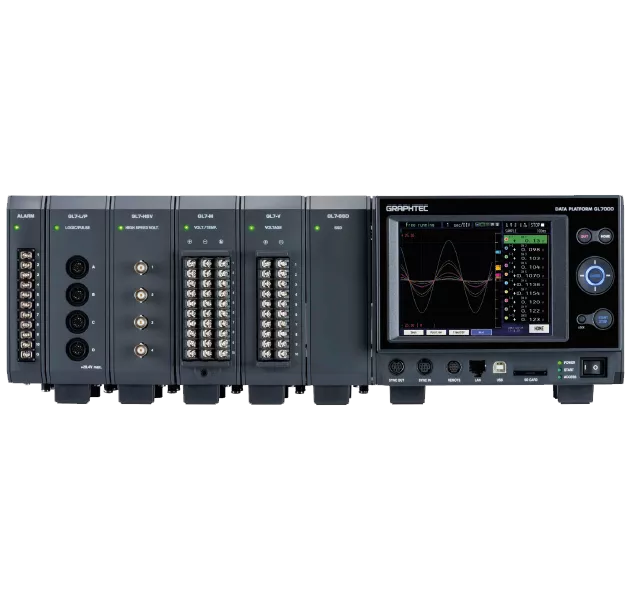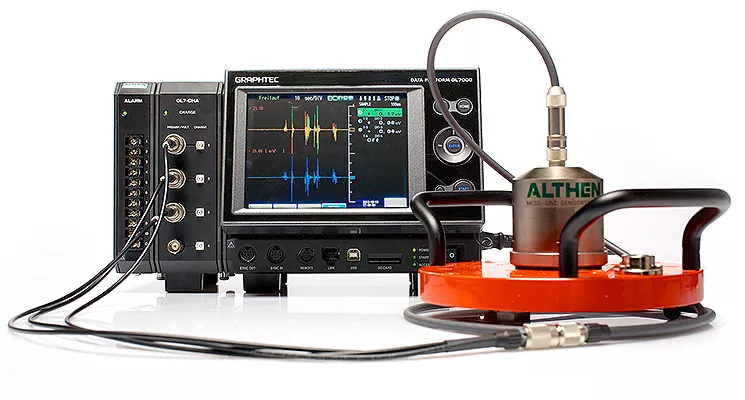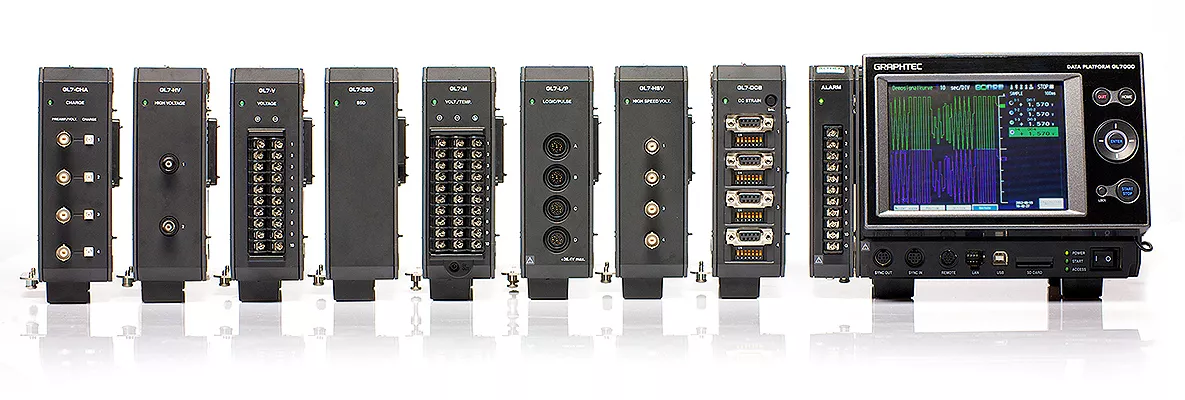GRAPHTEC Data Platform GL7000 System
Een modulaire data-acquisitie-eenheid
Over het Data Platform GL7000-systeem
De nieuwe generatie data-acquisitie-eenheid kan het gewenste signaal meten volgens de behoeften en kan uitbreiden naar andere toepassingen door verschillende versterkermodules toe te voegen. Het kan worden bevestigd aan een displaymodule met een aanraakscherm, gebruikt als een stand-alone unit of ingebed in een systeem.
Belangrijkste kenmerken GL7000-systeem
- 7 soorten ingangsmodules voor spanning, temperatuur, gelijkstroomspanning, trillingen en logica/puls
- beschikbaar
- 4 soorten functiemodules: display, SSD, alarm, uitgangsspanning
- Er kunnen maximaal 10 modules worden aangesloten.
- Flexibele modulecombinatie maakt een breed scala aan metingen mogelijk
- Door de high-definition displaymodule met aanraakscherm te bevestigen, is zowel stand-alone bediening als integratie in een systeem mogelijk.
- 2 interfaces voor aansluiting op uw pc: USB 2.0 en Ethernet
- 4 bestemmingen om de opgenomen gegevens op te slaan: ingebouwd RAM, ingebouwd Flash-geheugen, SD-geheugenkaart en SSD-module.
Heeft u deze sensor nodig voor uw project?
Vraag een vrijblijvende offerte aan of stuur ons uw contactgegevens voor een gratis en vrijblijvend gesprek. Onze sales engineers nemen dan binnen maximaal 1 tot 2 werkdagen contact met u op.
Product downloaden
Praat met onze experts
Niet precies wat u zoekt? Wij bieden standaard sensoren, maar kunnen u ook helpen met voor u aangepaste sensoren of een volledig op maat gemaakte meetoplossing. Neem contact met ons op voor advies of prijzen.
Praat met een expertTechnische specificaties
| Specificaties | Waarde |
|---|---|
| Alarm output terminal: Approx. 30 x 136 x 145 mm (Excluding projection) | |
| Analog voltage: Converts by four reference points (gain, offset) | |
| Analog: Higher/Rising, Lower/Falling, Window-in, Window-out | |
| Analog: Higher/Rising, Lower/Falling, Window-in, Window-out | |
| Data destination for backup cannot be specified to the same storage for destination of capturing data. | |
| Data destination: SD memory card, SSD, FTP server | |
| Disabled (OFF): Data capture is completed in a single trigger | |
| Disabled (OFF): Data in the RAM is not maintained after power is turned off | |
| Enabled (ON): Data in the RAM is saved automatically to the built-in Flash, SD memory card, SSD | |
| Flash memory (2 GB, built-in the main module) | |
| Logic (*5): Higher/Rising, Lower/Falling | |
| Logic (*5): Higher/Rising, Lower/Falling | |
| Marker: Marker is able to record for occurring alarm or power failure. | |
| Pulse (*5): Higher/Rising, Lower/Falling, Window-in, Window-out | |
| Pulse (*5): Higher/Rising, Lower/Falling, Window-in, Window-out | |
| Pulse count: Converts by two reference points (gain) | |
| Relay (*13): Saved data to multiple file without losing data until capturing data is stopped (Destination of data: Built-in Flash, SD memory card, SSD) | |
| Ring (*12): Saved most recent data (Number of capturing data: 1000 to 2000000 points, Destination of data: Built-in RAM, Built-in Flash, SD memory card, SSD) | |
| Signal type: Contact (relay), Open collector, Voltage | |
| Signal type: Open collector (pulled-up by resistor 10 kΩ) | |
| Stop: Off, Measured signal, Alarm, External signal, Clock, Week or Time | |
| Temperature: Converts by two reference points (offset) | |
| The file for capturing data is limited up to 2GB | |
| Accuracy of clock (at 23°c) | ±0.002% (Monthly deviation approx. 50 sec.) |
| Alarm determination condition (*6) | CCombination: OR or AND condition at the level of signal or edge of signal |
| Alarm output | 10 channels |
| Analyzing frequency range | 0.08, 0.2, 0.4, 0.8, 1.6, 2, 3.2, 4, 8, 20, 40, 80, 200, 400, 800 Hz, 2, 4, 8, 20, 40, 80, 200, 400 kHz |
| Annotation function | Comment can be set in each channel (up to 31 alphanumeric characters) |
| Auto save (*11) | Available for the built-in RAM |
| Averaging | Summation average, Exponential average, Peak hold |
| Backup (*11) | Backup interval: Off, 1, 2, 6, 12, 24 hrs. |
| Between channels | Addition, Subtraction, Multiplication and Division for two analog inputs (Sampling speed is limited up to 10 Samples/s (100 ms interval). Available arithmetic element and the output destination is the analog input channel 1 to 100.) |
| Built-in | RAM (2 million samples, built-in amplifier module), |
| Captured data (*11) | Built-in RAM, Built-in Flash, SD memory card, SSD (Data is saved directly to it.) |
| Capturing mode (*11) | Mode: Off, Normal, Ring, Relay |
| Channels | 4 channels |
| Data in built-in ram | Specified number of data up 2 million samples in increments of 1 |
| Display mode | Ethernet (10 BASE-T/100 BASE-TX), USB 2.0 (High speed) |
| During data capture (*15) | Displaying information in two windows, Hot-swapping the SD memory card, Saving data in between cursors. |
| Engineering scale function | Measured value can be converted to the engineering unit |
| External (*11) | SD card (Support SDHC, up to 32GB) slot, SSD (Approx. 128GB) |
| External dimensions (w x d x h) | Main module: Approx. 193 x 141 x 160 mm (Excluding Projection), |
| Functions | Y-T, Linear, Power, PSD, Cross, Transfer function, Coherence, COP |
| Input | Start/Stop, External trigger, External sampling, Auto balance (*3) |
| Message / marker functions | Message: The registered messages or entered message is able to be recorded for any timing. Up to 8 messages can be pre-registered. |
| Model number | GL7000 |
| Move function of the display range | Beginning, center or end of the data, Trigger point, Specific time (absolute, relative), Call cursor |
| Network function | WEB server, FTP server, FTP client, NTP client, DHCP client |
| Number of input channels | Max. 112 channels in 1 of GL7000 |
| Number of module | Attached to up to 10 modules (*1) |
| Number of points | 500, 1000, 2000, 4000, 10000 |
| Operating environment | 0 to 45°C, 5 to 85% RH (non condensed) |
| Output | Trigger, Busy (*3), Alarm (10 channels) (*4) |
| Power consumption | 140VA |
| Power source | 100 to 240 V AC, 50 to 60Hz |
| Pre-trigger (*7) | Number of data before trigger: Up to specified number of captured data |
| Resume | Resume automatically in the same condition after power is recovered as when the power failure occurred during data capture (*9) |
| Search function | Search for analog signal levels, logic signal pattern, pulse signal levels or alarm point in captured data |
| Standard accessories | Quick guide, CD-ROM, AC power cable |
| Statistical | Select two calculations from Average, Peak, Max., Min. in real time and replay (*8) |
| Synchronization between units | Start and Trigger (*14) |
| Trigger action | Start or stop capturing data by the trigger |
| Trigger determination conditions for measured signal | CCombination: OR or AND condition at the level of signal or edge of signal |
| Trigger repeat | Enabled (ON): Automatically re-armed for the next data capture function |
| Trigger source | Start: Off, Measured signal, Alarm, External signal, Clock, Week or Time |
| Usb drive mode | Emulate the USB memory device (*10) |
| Weight | Main module: Approx. 2.2 kg, Alarm output terminal: Approx. 350 g |
| Window function | Rectangular, Hanning, Hamming, Blackman, Flat-top, Exponential |



